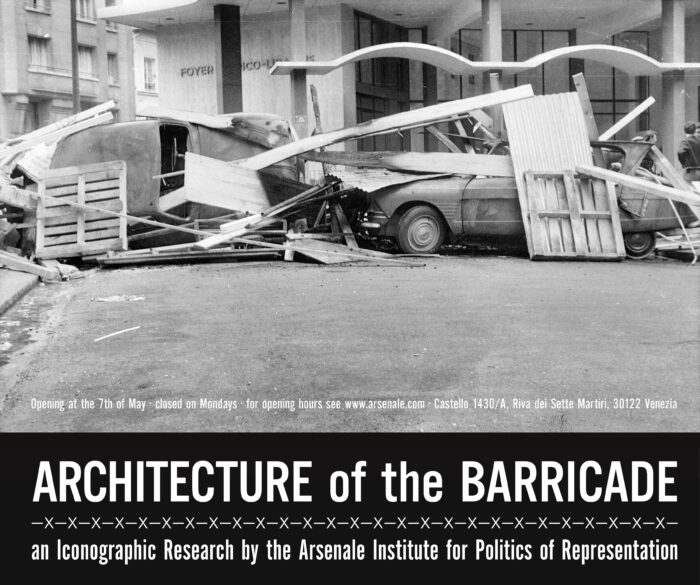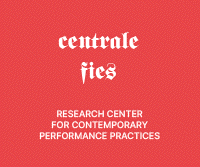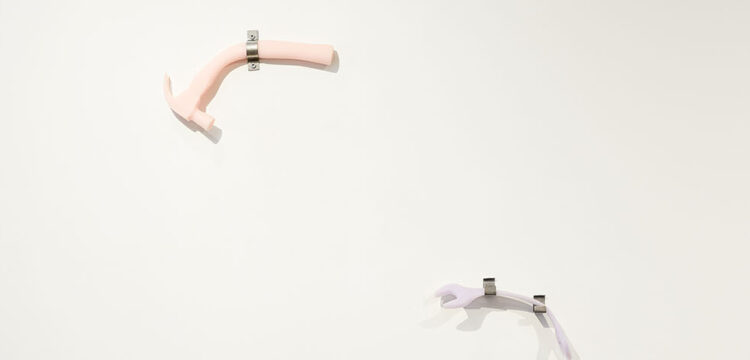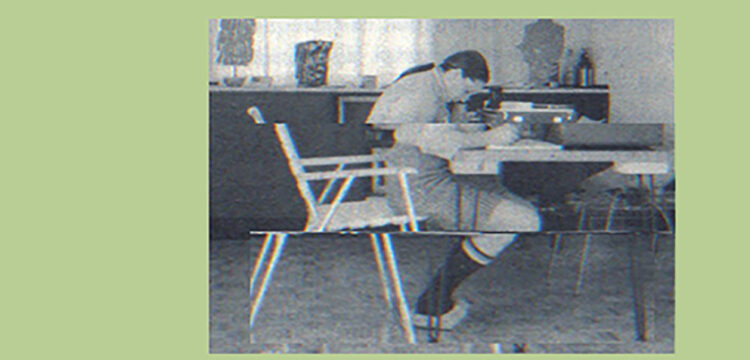Exploding the Domestic
A conversation with Beatrice Gibson on “Dreaming Alcestis”
“In every story I tell comes a point where I can see no further.”
Anne Carson
Arriving in Sicily in the evening. Taking the train from the Palermo airport along the coast into the city. Every time I land on this island I’m faced with romanticization and despair—the two exist so well together here, and perhaps within me as well. Palm trees. Garden shacks. Sunset. Stray dog. Shouting across the softest warmest breeze. But there is more here—going to meet Beatrice Gibson I am overcome with curiosity and excitement. I don’t know what conversations and pathways lie ahead.
I drop off my bags and go to find Beatrice. It’s only then I realize we’ve only been communicating via email and I don’t have her phone number. There is an event she’s organized, a performance at the Cantieri Culturali for the final night of the Queer Sicilia film festival, where some musician friends from London @xcrswx Crystabel Riley and Seymour Wright will be performing. The space is large though and as thunder rolls overhead I cannot find the group. I ask other groups and another until someone gives me the right indication and I find them all. The performance is over but there is a DJ—half strangers, we all dance together. This event and the energy is indicative of the world Gibson has become a part of and has helped to build, a Palermo that is alive to new and at once ancient forces. These projects come together through her roving cinema Nuovo Orfeo which she co-founded in 2021 with Flora Pitrolo, Stella Sideli, and Pietro Airoldi. Named after the city’s last porn cinema the project brings experimental queer oriented film, music, art, events to a broad audience.
By the next day, after wandering around Ballarò market and eating too much fried fish, I begin to think an actual formal interview might not happen. The interview is happening in space. I begin to think Beatrice has brought me here to live the films rather than ask her directly about them—maybe that is the only way to get at them, sidesways and through osmosis. Her films, much like poetry, grant the observer with glimmers and ideas, they open worlds but not completely, not forensically. As Dreaming Alcestis investigates the role of rest and sleep in a work and the experience of the work induces rest, it only feels natural that this interview unwinds in its own time, in words but also in gestures.
Gibson has spoken out about the need to abolish the nuclear family. Oddly, as I saw her living it, Palermo has helped her on the microlevel in this mission. Her children are freer in Palermo than they were in London; they play with neighbors in the piazza, they learn to fish with real fisherman. The children are part of the whole of the community, have real relationships with their parents’ artists friends and the adults in their lives. I say oddly here because this so goes against common stereotypes of the southern Italian family, tightly bound, private.
After viewing Gibson’s film a few times and understanding Euripides’s telling of Alcestis’s tale, I see the counter narrative the film truly offers. Alcestis, had refused to marry, would not or could not be wooed, before her father King Pelias made an agreement, a deal. Alcestis, under a new lens, after having watched Gibson’s film, and her other films, feels like a film about total refusal. In a worldview where the underworld is real, active, present, Alcestis’s choice to go there rather than be married to King seems not just reasonable but wise. This choice seems similar to the choice Gibson made with her family during the pandemic, to remove themselves from the center of the neoliberal economy and place themselves along the periphery, trying to discover what that might mean and what new forms of family life might be rendered. Gibson acknowledges that like Queen Alcestis, she has had the privilege to make such a choice—moving from the center to the periphery so smoothly is endlessly more possible than vice versa; many of the privileges the center affords its denizens move with them to the periphery, as well.
Gibson kindly answered a few questions about her practice and film for me. The conversation about Dreaming Alcestis could truly be endless, so here is a beginning, a welcome into this world.
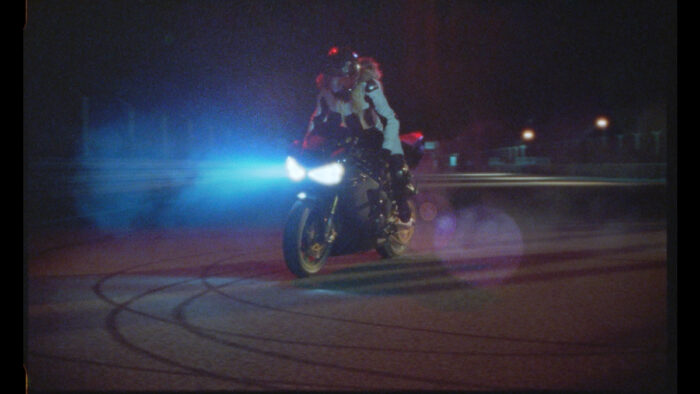
Allison Grimaldi Donahue: I am really interested in how you create an intersection between the domestic, so often associated with heaviness, chores, labor, for women with a dreamlike space and atmosphere, in your films and particularly in Dreaming Alcestis. Can you talk a little bit about this intersection? How you see it artistically but also how you live it, perhaps?
Beatrice Gibson: Dreaming Alcestis is a kind of collage of autobiographical, fictional, and mythological material. The narrative conceit of the film is structured around two people, a man and a woman, sleeping and dreaming in an apartment. They are actually having a collective dream, about a long dead queen—Alcestis. As they sleep their kids are playing at their feet. A very pretty serpent also makes an appearance. So, in a narrative sense, dreams of course very literally intersect with the domestic in the film, but they also do so in a more conceptual and or political way. The domestic, which is as you say, so often associated with drudgery and labor, is so often concretely experienced that way too, or at least my experience of it is so often that way. It can feel endless, unjust, like shifting sand as a friend once put it. So part of it, is me, or maybe in this instance us, (the film is co-directed by Nick Gordon my partner) in a feminist framework trying consciously to liberate ourselves from this oppressive idea of the domestic by reclaiming it as a potentially radical space, as a laboratory space for alternative kinds of relation, of living and being that are different to the ones scripted by patriarchy or capital. Whether that’s using the domestic to make art and films, re-configuring the family as a film crew, or using it as tool for personal transformation, in some ways I guess this is the aim: exploding the domestic. In the films, dreams are a kind of mystical tool, a way to do that, a way to puncture the patriarchal late capitalist version of the domestic. On a formal level in the film, the dream aspects bring in something more mythological, something a bit uncanny, and introduce a language that isn’t logical, rational, or discursive. I think of dreams as a profoundly feminist and political trope in this sense. Dream space, the unconscious, spaces of feeling they are realms somehow in defiance of a white male tradition, which is a tradition that has more to do with heading upwards, enlightenment style, into discourse rationality and logic. Dreams conversely are about descending, precisely as Alcestis does, away from logic, downwards into feeling and the irrational. Ursula K. le Guin would call it the language of the Mother Tongue. A language that’s opposed to the Father tongue: the distancing language of the academy, of rational and scientific pursuit. Le Guin’s idea of the Mother Tongue feels ever more relevant to me politically today, like a counter strategy for our age or something. Alice Notley an American poet that I love, who has also influenced me more than I can say, and who I think is always somehow present in my work both literally and imaginatively, (Alkestis is indebted to Alette of course) wrote an amazing essay on dreaming in which she say, “Dreams remind us that we can shape the world, that it doesn’t fit into the categories we tend to make for it.” In Dreaming Alcestis we wanted to experiment with dreaming, from a political point of view. To propose it as a valid and radical space for a different kind of (self) knowledge. Something that could help us reshape the world but crucially also the self. Who is it who said in the future therapy and politics will be interchangeable. It’s about that. Internal personal transformation as somehow key to political progress.
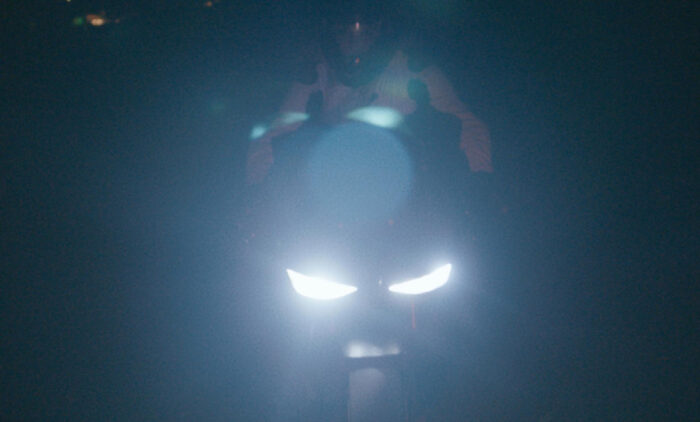
Dreaming Alcestis is the first film I’ve made entirely in dream space, it’s wordless, in some ways it’s an attempt at pure feeling. In the holographic version that was on show at Ordet in Milan the sleepers are projected through the screen onto the floor, the sound is woozy and immersive, and the crowd is somehow implicated in the dreaming. We all dream together, or perhaps are dreamt, by this radical woman, who descended as far as Death and returned. She’s a perfect figure for these end times. Free therapy from the ancients. Someone who can teach us how to die.
I am curious to know more about how you see the connections between film and poetry. When did you begin reading poetry? And with what? And what made you bring it into your films?
The connection between poetry and specifically more experimental film, to me or in my head is quite fundamental. I think of them almost as parallel endeavors on a kind of formal level. They both refuse to toe the line in terms of the rules, they’re like narrative’s naughty cousins. The Rebellious kids. I think a lot of the same formal devices are at play in both: they both take you to the brink of something and then somehow pull you back. You have a sense of a story but not the whole, an idea of a feeling but nothing precise. To me they are both extremely spacious, wide open. There is something similar in relation to audience and spectator there too, they let the reader or the viewer participate in the construction of meaning through enigma. They are both inherently imagination producing in that sense. Much more participatory in some way. To me, they trade in the fragment, the abstract, the idea of a never quite fully formed thing. I think that rather than telling you what to feel in a Hollywood soundtrack sense, they propose a sort of space of feeling that can you fall in and out of, that you grasp intermittently. They offer something much more present tense, in the Gertrude Stein sense of an immersive continuous present. You can somehow get inside a poem, an experimental film, whereas narrative is something your either behind or ahead off.
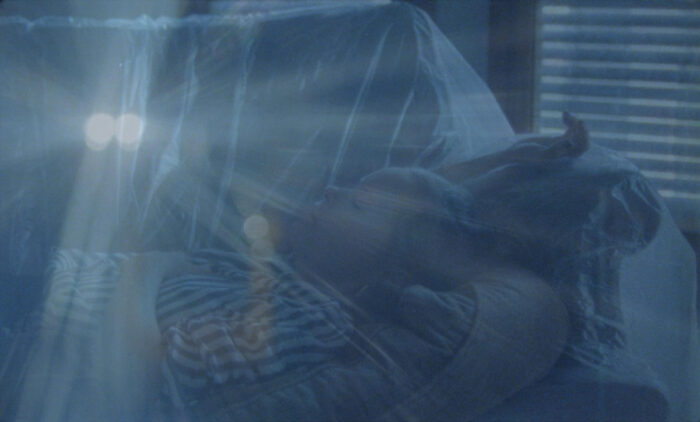
I started reading poetry really properly when my daughter was born in 2016. It was around the time of the Brexit referendum and the beginning of what now feels apocalypse 2.0. I was extremely hormonal, quite anxious about the cycle of news events and addicted to catastrophe via phone. So, I decided that instead of doom scrolling, reading poetry would be a much more productive way to spend my time. That I could maybe try to use it as an alternative news feed. At the same time it was the beginning of the current flirtation between poetry and the art world and so lots of great poets were readily available in the bookstores that I frequented. I started reading a lot of Eileen Myles, CA Conrad, North American poets really, Audre Lorde, Anne Carson, Alice Notley, Sophie Robinson, Precious Okoyomon. CA Conrad’s The Book of Frank, quite literally blew my mind and I decided to get in touch with them.
Formally, I think there’s a poetic form to all my films, but the idea of literally bringing poets inside the work, started with I hope I’m loud when I’m dead, a film that takes its title from one of CA Conrad’s poems and that features Conrad and Eileen Myles reading their poetry. It’s a film about being a parent, a mother in the world in time of socio-political and economic collapse and posits the poet, as a kind of guide though turbulent times. It finishes with a letter to my daughter about trying to find a set of references for her and to put them all in one place so that she can access them in her own life and when she encounters turbulent times. The references are mostly female and non-binary poets coming from a feminist perspective, and lines from their poems float through the film.
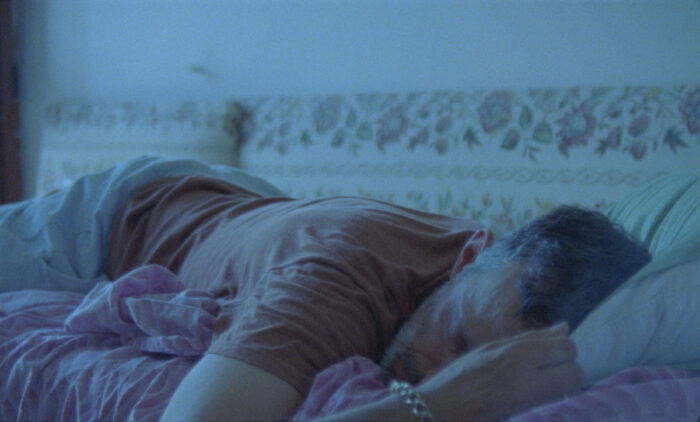
During your conference at the Botanic Garden of Palermo the difference between ‘mothering’ and ‘motherhood’ came up. I am interested to know more about how you see the difference and if this comes up in the films in an explicit way, what might it mean? Could we even stretch it to be that some of these poets you feature impart mother-like wisdom?
Yeah totally, I’ve think I’ve been searching for mother’s entire life really. Mothers of course in the expanded sense of kin and community as opposed to birth or blood mothers. My own mother is a complicated person, with mental health issues. Becoming a mother myself radicalized me politically more than anything else has in my life. Because of my race, class and economic privilege I just hadn’t really encountered substantial barriers or borders previous to that. I’m not interested in the inward looking, nuclear, neo-liberal version of family or mothering dreamed up by white male culture. I’m interested in the idea of motherhood and its associated spheres as a radical paradigm for relational experience, as a micro-laboratory for how to be, in relation to self and other. Becoming a mother for me was and continues to be transformative politically; one of the most radical experiences of relationality I’ve ever had. I’m interested in pushing that experience out into the world, out from the context of my own intimate domestic space, into the wider context of society. How should I act, who should I be in relation to other in general. I hope I’m loud when I’m dead is full of mothers, myself, poet mothers, Audre Lorde Adrienne Rich, Alice Notley, but also absent mothers. In one scene the camera cuts between my partner and our very young kids in the bath in our former home in London and footage of very young child being passed from a howling Mediterranean sea onto a rescue boat. Two bodies of water intersect, one belonging to a highly privileged family at bath time, one belonging to a victim of global inequality, violent conflict, and the perilous and horrendous migration policies of the Right at sea. What is my responsibility to the other, in relation to those two bodies of water, and shouldn’t it maybe be one and the same?
The idea of mothering over or against motherhood that came up in the conference was a reference to the amazing Pauline Alexis Gumbs. Gumbs defines motherhood as implying status / ownership or property whereas mothering is more of a verb, a practice, a radical relational practice. Anyone can mother, since the term is divorced from biological relation. She blows the space of domesticity apart, turns in inside out and pushes it in to the word. She queers it, which I find amazing and liberatory.
To circle back, motherhood, domesticity, family, I think they have definitely been some kind of antidote for me in socially and politically turbulent world. Maybe not so much or only as refuge but as proposal too. As somehow who didn’t particularly want children as a younger woman, this continues to be revelatory for me. I want a version of the domestic, of being a woman and mother in a family, that explodes its own script, not simply as a radical, relation practice, but also in the context of what it includes. What it can include in a lived way. My version of family, of family life, includes and contains art and care, activism, making films, community, friends and influences—from my favorite literary characters, to intellectual godmother’s, and even ancestral guides. It stretches back to the Gods.
Dreaming Alcestis is now part of the permanent collection at the Museo Civico di Castelbuono and is screening there through 10 September 2023. Co-directed with Nick Gordon and co-written with Maria Nadotti, the film is theoretical but oneiric, calling viewers into a space where dreams are granted the power they deserve.
Dreaming Alcestis is supported by the Directorate-General for Contemporary Creativity by the Italian Ministry of Culture under the Italian Council program (2021), commissioned by the Museo Civico di Castelbuono (Palermo) and Southbank Centre’s (London) Hayward Gallery Touring for British Art Show 9. The film is an Okta Film production, with additional support from ICONOCLAST and Somesuch.


